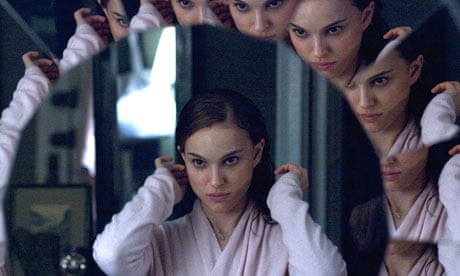Fantastically deranged at all times, Darren Aronofsky’s ballet psycho-melodrama is a glittering, crackling, outrageously pickable scab of a film. At its centre is young ballerina Nina Sayers, played by Natalie Portman. She is beautiful, vulnerable, sexually naive and susceptible to mental illness. To play the role of a lifetime, Nina must delve deep into her own dark side. As her hallucinations and anxiety attacks escalate in tandem with her progress in rehearsal, artistic breakthrough fuses with nervous breakdown. This is a movie about fear of penetration, fear of your body, fear of being supplanted in the affections of a powerful man, love of perfection, love of dance, and perhaps most importantly of all, passionate and overwhelming hatred of your mother.
Portman has decisively moved out of the ugly duckling phase of her career with this tremendous performance as Nina, a hardworking corps member of a New York City ballet company who has low-level dieting and self-harm issues more or less under control. She lives with her difficult mother – an impressive and satisfyingly nasty performance from Barbara Hershey – who abandoned her own stagnant ballet career on being impregnated by some heartless, mercurial mogul or other, and channelled her rage and disappointment into coaching the resulting daughter, whom she has attempted to infantilise by filling her pink bedroom with gonks and installing a deplorable musical box that tinkles the theme from Swan Lake.
We join the story as the company is about to dispense with its bitter has-been star (and wrecked gamine) Beth Macintyre: the casting of Winona Ryder is sadistically judged. The company’s exacting director Thomas Leroy, played by Vincent Cassel, is looking for someone new to play the lead in Swan Lake. His hooded eye settles on tremulous Nina. But he warns her that the biggest challenge will be playing the character’s evil twin, the “Black Swan”. She has to find the darker, more sensual side of herself. Thomas invites Nina back to his apartment for intimate drinks. To develop the role, he instructs her to go home and touch herself. Touching Thomas also appears to be on the agenda. This is not based on anything by Noel Streatfeild.
In addition, Thomas encourages Nina to admire the company’s new ballerina: funky free spirit and Olympic-standard minx Lily (Mila Kunis), who helps unlock Nina’s life-force with seductive overtures of friendship, and more. But does Lily simply want to steal Nina’s role? As Nina’s anxiety intensifies, she is worried about a weird feathery skin-rash and becomes convinced that her reflection in the mirror continues to stare at her after she has turned away.
As a study of female breakdown, Black Swan is the best thing since Polanski’s Repulsion. But, in fact, with its creepy Manhattan interiors, its looming, closeup camera movements, and its encircling conspiracy of evil, it looks more like Rosemary’s Baby, particularly in cinematographer Matthew Libatique’s brilliant continuous shot in which Nina makes out with a random guy in a club, then wakes up to what she’s doing and, freaked out, blunders through murky winding corridors and out into the night air – there seems no difference between inside and outside. Everywhere is claustrophobic.
Of course, any ballet movie has to be compared with Michael Powell and Emeric Pressburger’s The Red Shoes, and the figure of Thomas is obviously inspired by Anton Walbrook’s legendary martinet – although Thomas is rather less high minded – and Nina’s POV pirouette-whirl in rehearsal is also taken from Powell and Pressburger. But again, their influence might be more from the convent drama Black Narcissus, and the final confrontation of Kathleen Byron and Deborah Kerr. There are also hints of John Landis’s An American Werewolf in London.
This happens to be the second film recently that has used the Swan Lake theme – Xavier Beauvois’s Of Gods and Men featured it counterintuitively, at the crisis of an ascetic and spiritual tale of French monks. Its use in Black Swan is self-explanatory – it is more obviously grandiloquent and excessive and appropriate to the fireworks going off in Nina’s head. (In both cases, the Swan Lake theme is technically diegetic, in that the music is physically present in the story, being played respectively on the monks’ old tape machine and in the orchestra pit.) But my goodness, Aronofsky likes to play that Swan Lake theme loud. He’s probably right to do so. Tchaikovsky’s rich, gloriously direct music needs to be punched over, and punched over it is. Motörhead could not have played the Swan Lake theme any louder than this. I left the cinema with blood trickling from my ears.
Black Swan is ionospherically over the top, and some of its effects are overdone, but it is richly, sensually enjoyable and there is such fascination in seeing Portman surrender to the madness and watch her face transmute into a horror-mask like a nightmare version of Maria Callas. It is exciting, quite mad and often really scary.

Comments (…)
Sign in or create your Guardian account to join the discussion